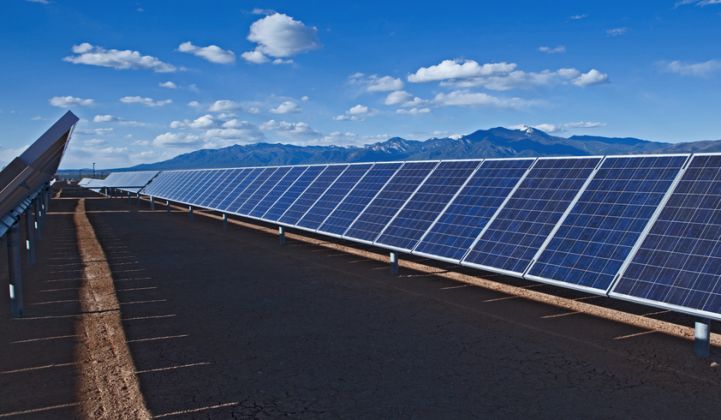In April, Mexican firm Fortius opened the 8-megawatt Jalisco I solar plant, making it the first merchant solar plant in Mexico in the wake of the country's market reforms. It is now planning a second similar project.
It was a groundbreaking development. But it's too early say whether merchant PV is going to take off in Mexico.
With record-low solar prices in last year’s auctions and investor confidence rattled by currency depreciation, such projects appear to be high-risk.
Unlike utility-scale plants anchored by long-term power-purchase agreements, merchant solar plants sell electricity into the wholesale market, and require reliability of demand and definition of price over the long term to guarantee a healthy return on investment.
Fortius’ director general for solar, Sergio Alcalde, told GTM he is confident that the business model can work, however.
“The two auctions last year reinforced investor and developer confidence in Mexico’s electric power market, and which, coupled with the country’s solar potential, are creating opportunities, aided by local government promotion of the energy sector,” he said.
“We’ll see the country upholstered in solar panels in a few years’ time.”
He said the $14 million merchant project will generate certainty and confidence for similar developments in Mexico.
Once the second 8-megawatt project is up and running, it will supply electricity to 32,000 low-income households, which will consume 70 percent of the electricity generated by the plant. The company also plans to target local industries, said Alcalde.
Fortius is in talks with at least six other offtakers, and will develop the second phase of the plant in conjunction with SolarCity. The developer plans to build other larger-scale projects alongside SolarCity as well.
Alcalde said support from local authorities and the Jalisco state government on permit and land acquisition for the 25,000-panel plant was important for executing the project. The Jalisco I plant was built on a dry lake bed to mitigate its environmental impact.
In mid-2016, Jalisco launched an energy promotion agency aimed at growing renewables use in the state with the country’s fourth-largest energy consumption. Other local projects in the pipeline include a 100-megawatt PV park planned by Jinko Solar after last March’s power auction.
Mexico’s first merchant PV plant was the 39-megawatt Aura Solar I in Baja California Sur, which entered operation in 2013, but was knocked out of action the following year by Hurricane Odile. It came back on-line in 2016.
That project was developed by local firm Gauss Energía, whose president, Hector Olea, is also head of the country’s solar power association, Asolmex.
“Solar growth is at the forefront of generation expansion, and we will go from 200 megawatts now to around 4 gigawatts by late 2018,” Olea told GTM.
“There are two reasons for this: one is the low prices achieved at auction, and the other is the abundant solar resource, with 85 percent of the country’s territory boasting potential for solar development. There is a pipeline of projects that is creating market opportunities, and Mexico will quickly become a leading solar power in the region," he said.
"Solar dominated the first two auctions, and that trend will continue with the third auction,” he said. The energy ministry expects the third auction will triple the country’s installed renewables capacity.
Olea said Mexico's transmission weaknesses make distributed merchant solar a more attractive opportunity.
Mexico plans to launch a long-delayed tender this year for a $1.2 billion transmission line connecting the wind hub of Oaxaca with the country’s central region to avoid a possible project bottleneck.
But GTM Research solar analyst Manan Parikh expressed doubts about strong growth for merchant solar in the country.
“I don’t think it’s going to be a boom market yet, as you could be exposing yourself to lower returns. And larger projects within the merchant scheme that are not processed through the auctions may also face problems procuring permits, and that could impede development,” he said.
Parikh described the 9-megawatt Jalisco plant as “a little bit of a drop in the bucket in terms of capacity, but it could be part of a ground swell, of smaller, merchant projects that would be less risky.”
“Mexico’s system costs for utility-scale are already under $1 per watt, which is forecast to decrease further, and while there will be demand for clean energy certificates, that may not be the biggest incentive for merchant solar projects," he said.
And while Parikh remained upbeat about the execution of solar projects awarded in last year’s auctions, he tempered his enthusiasm for the merchant model.
“Maybe we’re reading too much into it, but this merchant plant is not a huge development, and I think large developers with experience in other projects will explore the PPA route before exploring merchant solar,” he said.
***
Adam Critchley is the Mexico energy correspondent for Business News Americas.



